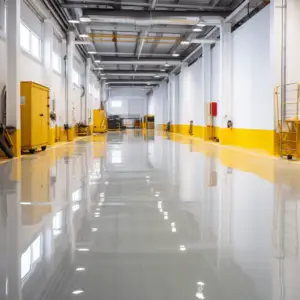With so many different options available, choosing the right garage flooring can seem like a daunting task. However, knowing a little bit about the advantages of epoxy vs. tile garage floor can take out some of the guesswork and make it easier to find the flooring that’s right for your garage.
Table of Contents
What is Epoxy vs. Tile Garage Floor?

Epoxy:
Epoxy is a thick coating poured over concrete that creates a strong and durable surface. It can be tailor-made for any garage flooring need, whether it’s making the space safer or adding an appealing pop of color.
Tile:
A tile garage floor is one of many options for surfacing your garage floor. Tile comes in a variety of materials and designs, but the most common are porcelain and rubber.
Tile is easy to install and clean, but the downside is that tiles can crack or break if you drop something heavy on them.
Epoxy vs. Tile Garage Floor – What are the Differences?
Some people are loyal to epoxy for their garage floor, and others swear by tile. Although the two cost about the same, there are a few key differences to be aware of before you decide which one you’d like to use.
Epoxy vs. Tile Garage Floor – Durability:
How long will an epoxy floor last?
Some manufacturers claim that their products are good for at least 20 years. This is probably true if the floor is properly maintained. Epoxy-coated garage floors are likely to last longer than this. However, it is important to note that the life expectancy of your floor depends on a number of factors, such as traffic and sunlight exposure.
How long will a tile garage floor last?
Tiles should last for about 10 years if they are looked after properly. Regular cleaning will improve their lifespan by keeping them free from dirt and stains. You should also check that your tiles are not cracked or broken because this can cause damage over time due to moisture getting into the cracks and causing mold growth.
Epoxy vs. Tile Garage Floor – Installation:
Epoxy is a good option for DIY installation since it’s available in kits that can be purchased online or at any big box store. The only thing you need for epoxy installation is a paint roller and a strong arm to spread it out evenly.
If you don’t want to install either option yourself, both will be relatively affordable compared with other types of garage flooring such as stone or concrete.
Most tiles are made from thin sheets that interlock together in a way similar to puzzle pieces or Legos. This makes it easy for a homeowner to install themselves if they feel confident about their handyman skills.
Epoxy is much easier to install yourself than tiles. There’s no need for careful measuring and cutting when you’re using epoxy, with its liquid consistency. However, you will need to prepare the surface properly with cleaning and etching before applying it.
Epoxy vs. Tile Garage Floor – Appearance:
Both epoxy paint and tile come in many colors and styles, so you can get almost any look that you want from your new flooring, but if you want a more sophisticated look in your home, it’s difficult to beat tile. Garage tiles can come in different sizes and shapes to create patterns, such as diamond plate or checkerboard designs.
Epoxy vs. Tile Garage Floor – Maintenance:
Epoxy requires very little maintenance — just sweeping and mopping. It can be easily cleaned and will not stain as easily as concrete. Clean up spills immediately and avoid harsh chemicals for cleaning.
Tiles require more care as they can get dirty in the grout lines and require regular cleaning to be maintained well. Tile will require regular grout cleaning to prevent stains and deterioration. Make sure to use a tile cleaner that is safe for the type of tile you have installed.
Epoxy vs. Tile Garage Floor – Cost:
An epoxy floor has a slightly higher initial cost than garage tiles. Since the epoxy surface is seamless, you don’t need to worry about resealing or replacing it. Garage tile needs to be sealed after installation and will eventually need to be replaced, so the lifetime cost of garage tile is higher than epoxy.
What are the Benefits of Installing Garage Floor Tiles?
Tile floors are less popular than epoxy, but they have a few advantages. They are more cost-effective and easier to install. If you’re looking for something simple and straightforward, tile is probably a better option.
When planning out your design, take into consideration the type of car that will be parked there and how much room you will need in between the tiles to ensure you have enough room to park and exit the vehicle.
What are the Benefits of Installing an Epoxy Floor?

Epoxy has several advantages over other types of floors. It’s durable, long-lasting, and easy to maintain.
Epoxy can withstand heavy weights and high temperatures without cracking or discoloring. It’s also resistant to oil, grease, and chemicals. In addition, epoxy floors are customizable with various colors and designs that can match your personal style or company brand.
Does epoxy have a strong odor?
Yes, but there are plenty of low odor options, including water-based epoxies. The odor comes from VOCs (volatile organic compounds), which are chemicals used in traditional solvent-based products. Newer epoxy formulas use less harmful ingredients for better indoor air quality.
Which is Better for Your Garage, Epoxy or Tiles?
For homeowners who have a garage that they use for more than just parking their vehicles, installing the right kind of flooring is essential to creating a space that will last. There are a lot of factors to consider before you start shopping for garage flooring.
There are some factors that can help you determine which one is best for your needs, such as cost, durability, ease of installation, maintenance, and customization. Both epoxy coatings and garage tiles work well in garages of all sizes, but there are some differences that can make one option more suitable than the other in certain situations.


